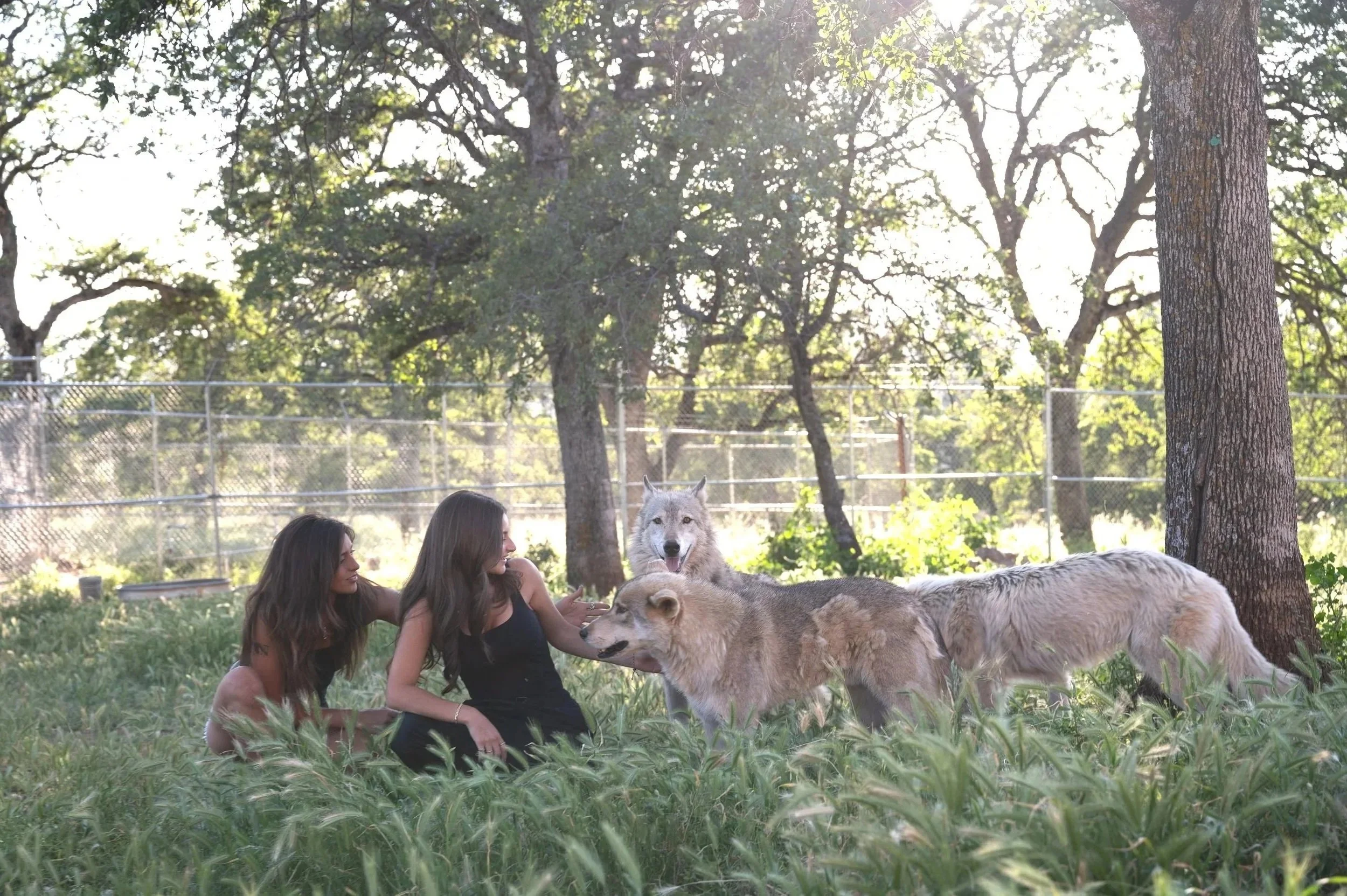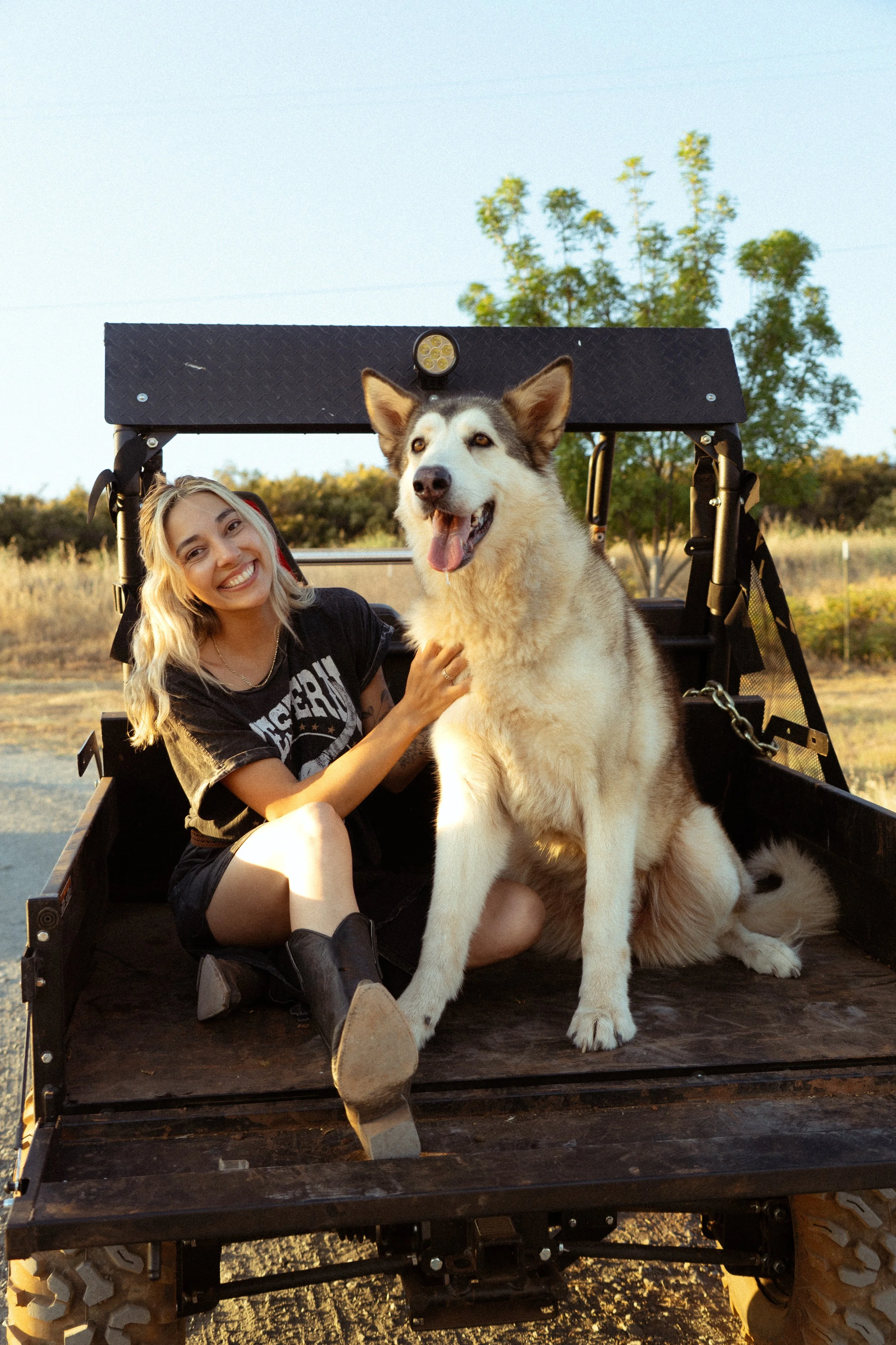
“Wolves and women are relational by nature.”
— Dr. Clarissa Estes
Our Story
Women for Wolves was founded in 2013 by conservationist and animal activist Anjali Ranadive as a grassroots movement to raise awareness for wolves and restore the feminine connection to the natural world.
After struggling with depression and self-harm, Anjali found healing through rescuing and caring for wolves and wolf-dogs — animals once discarded, misunderstood, and feared. In saving them, she realized they had saved her. That bond became the foundation of a mission to share this connection with others and give back to the very beings that helped her heal.
What began as a personal journey has evolved into a sanctuary for wolves and wolf-dogs, a conservation initiative, and a haven for women to reconnect, learn, and grow.
Our Evolution
Over the past decade, Women for Wolves has grown into a fierce advocacy group, solely run by women, who brings educators, sanctuaries, scientists, artists, activists, & indigenous leaders together to advocate for wolves & reimagine coexistence between people and wildlife.
Since our founding, we have:
Empowered 60+ women to become leaders in conservation, sanctuary work, and wildlife education
Led 40+ youth programs teaching coexistence, rewilding, and environmental stewardship
Reached over 7 million people through education, advocacy, and storytelling
Rescued and rehabilitated over 300 animals, offering lifelong sanctuary to wolf-dogs in need
Advocated and lobbied on over 30 causes & bills.
Our mission works toward a future where wild wolves and wolf-dogs are safe, women are empowered, and people live in harmony with the natural world.
By uplifting women, centering Indigenous knowledge, and protecting apex species like wolves, we are restoring balance to ecosystems and to ourselves.
Our Model
The Women for Wolves model centers on compassion-driven conservation — integrating rescue, education, art, and policy to create tangible impact. Our programs include:
Wolf-Dog Rescue & Sanctuary Care
Wild Wolf Protection & Policy Advocacy
Indigenous Partnerships & Coexistence Programs
Youth and Women’s Empowerment Initiatives
Habitat Rewilding and Land Stewardship Projects
Our Vision
We envision a world where wolves roam freely through thriving ecosystems, women lead with courage and compassion, and communities coexist with nature rather than control it.
Through storytelling, science, art, and activism, Women for Wolves is rewilding the human spirit — reminding us that healing the planet and healing ourselves are one and the same.
Together, we are the voice for the voiceless.
Together, we are Women for Wolves.
MEET THE TEAM
-

Anjali Ranadive
FOUNDER & PRESIDENT
Anjali Ranadive founded WFW at UC Berkeley to unite women passionate about conservation. After rescuing a wolf-dog from a local shelter, she recognized the urgent need to protect them, and started the sanctuary. As an environmentalist, artist, and sports professional, she leverages her diverse background to forward the WFW mission.
-

Reena Hachme
CO-FOUNDER & VICE-PRESIDENT
Reena joined Women for Wolves in 2022 with a Marketing and Communications degree, using her skills to promote wolf conservation. Previously, she volunteered on environmental projects relating to plastic pollution. As Co-Founder, her focus is women’s empowerment and sanctuary operations.
-
Sofía Hughes
SANCTUARY DIRECTOR & CEO OF REWILDLING
Sofia’s journey began three years ago when she rescued her reactive German Shepherd, Blue. Through patience and training, she helped him overcome his fears. Now, she is devoted to offering transformative care to rescued wolf-dogs.
-

Tara Dehdari
DIRECTOR OF TECHNOLOGY
-

Jill Lute
DIRECTOR OF REHABILITATION
Jill Lute served as Senior Keeper at Folsom Sanctuary in Northern California for over a decade. She also has rescued many wolf-dogs throughout her life and career, and is an expert on wolf-dog behavior. Jill’s experience is invaluable to the mission of Women for Wolves.
-

Veronica Figueroa
DIRECTOR OF CONTENT & FILM
-
Diego Lopez
DIRECTOR OF CONSTRUCTION & DEVELOPMENT
-

Jessica Hernandez
DIRECTOR OF INDIGENOUS LEADERSHIP
Jessica is a Maya Ch’orti and Binnizá-Zapotec environmental scientist, author, and researcher at the University of Washington. Her work centers on climate, energy, and environmental justice, weaving Indigenous knowledge and Western science to build more just and sustainable futures. Through her leadership we will strengthen partnerships with tribes, elevate Indigenous voices, and ensure that traditional ecological knowledge guides our programs.
Frequently asked questions
-
Wolves are essential for the health of our ecosystems. They help fight climate change and maintain balance. Unfortunately, they are often hunted due to fear and misunderstanding. Since being removed from the Endangered Species Act, cruelty toward wolves has increased. Ranchers kill wolves out of concern for their livestock, but predators cause less than 0.01% of cattle deaths in areas where wolves live.
-
A wolf-dog is a mix between a wolf and a domestic dog. They are frequently abandoned by their owners due to their specialized needs. Many end up in shelters where they’re euthanized 90% of the time because they don’t fit as pets or wildlife. Sanctuaries like ours provide them with a safe, enriched environment while educating the public on their true nature, wild wolf conservation, and the realities of irresponsible ownership.
-
Wolves can be protected with stronger laws, advocacy, and raising awareness about their essential role in our ecosystems. Changing how people view wolves is crucial, making education key in wolf conservation.
Wolf-dogs need protection by discouraging breeding and selling, promoting adoption, supporting specialized sanctuaries, and educating the public.
Supporting conservation groups and wolf-dog sanctuaries can create positive change.
-
You can help wolves and wolf-dogs in several ways:
Spread the Word!
-
Advocacy and Lobbying: Researching laws that impact wolf protections, contacting representatives, and mobilizing people to take action.
Rescuing Wolf-Dogs: Providing sanctuary for 27 wolf-dogs, rescuing and placing others, and discouraging breeder purchases.
Education and Women’s Empowerment: Offering programs for youth to learn about environmental stewardship and wolf protection, providing women's empowerment activities like group therapy, and scholarships for women aiming for conservation careers.

